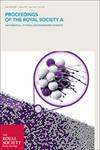A computational framework for agglomeration in thermochemically reacting granular flows
Proceedings of the Royal Society of London. Series A. Mathematical and Physical Sciences
Pub Date : 2004-12-08
DOI:10.1098/rspa.2004.1277
引用次数: 58
Abstract
A computational framework is developed which couples a series of models, each describing vastly different physical events, in order to characterize particle growth (agglomeration) in thermochemically reacting granular flows. The modelling is purposely simplified to expose the dominant mechanisms which control agglomeration. The overall system is comprised of relatively simple coupled submodels describing impact, heat production, bonding and fragmentation, each of which can be replaced by more elaborate descriptions, if and when they are available. Inverse problems, solved with a genetic algorithm, are then constructed to ascertain system parameters which maximize agglomeration likelihood within a range of admissible data.热化学反应颗粒流中团聚的计算框架
为了描述热化学反应颗粒流中的颗粒生长(团聚),开发了一个计算框架,该框架耦合了一系列模型,每个模型描述了截然不同的物理事件。该模型有意简化,以揭示控制集聚的主要机制。整个系统由相对简单的耦合子模型组成,这些子模型描述了冲击、产热、结合和破碎,如果有可能,每个子模型都可以被更详细的描述所取代。然后构造逆问题,用遗传算法求解,以确定在可接受数据范围内最大集聚可能性的系统参数。
本文章由计算机程序翻译,如有差异,请以英文原文为准。
求助全文
约1分钟内获得全文
求助全文
来源期刊
自引率
0.00%
发文量
0
期刊介绍:
Proceedings A publishes articles across the chemical, computational, Earth, engineering, mathematical, and physical sciences. The articles published are high-quality, original, fundamental articles of interest to a wide range of scientists, and often have long citation half-lives. As well as established disciplines, we encourage emerging and interdisciplinary areas.

 求助内容:
求助内容: 应助结果提醒方式:
应助结果提醒方式:


